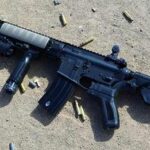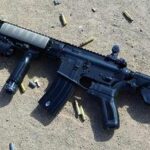The Halacha Of Armed Self-Defense.
There are several instances of armed self-defense in Torah. The first mention I would like to discuss is Bereshit* 14-1 to 24 Abraham comes to the defense of Lot who is captured by the Four Kings in their war against the Five Kings. He gathered 318 men in his camp and rescues Lot who was being held prisoner by the Four Kings and defeats them in battle. (14-12 to 16)
In Shemot* There are several examples 2:12, Moses slays the cruel Egyptian slave master who was about to murder an innocent Jew, 13-18 and 17-8 to 16. Both of these citations are from Parsha Beshelach. At Chapter 13 verse 18, Torah notes that the liberated Israelites took up arms. “So God led the people around [by] way of the desert [to] the Red Sea, and the children of Israel were armed when they went up out of Egypt.” Seizing weapons from the Egyptians was important. After crossing the Red Sea our forefathers were set upon by the Amalekites Chapter 17 verse 8 to 16. Without the weapons, when the Amalekites attacked the rear of the column, they could have easily overwhelmed our ancestors.
The last two examples before we look at the halacha are Chanukah and Purim. The Maccabean revolt against the Seleucid Greeks is the basis of the Chanukah story. Everyone here knows the basic story of how the Maccabees rose up from under oppression and overthrew the Greeks. Our ancestors could not have done so, without arms and help from Hashem.
At Purim, not only do we celebrate the down fall of Haman, but the persons allied with him. In the story, the Jews are allowed to go out and preemptively strike the allies of Haman. The Jews specifically allowed to arm themselves, seek out their enemies and kill them.
It is clear from the texts that not only were Jews armed, but were allowed to use those weapons to defend the nation. While defending others is discussed, see Shemot* 2:12 above, what about defending yourself? There is not a direct mention.
Our Rabbis did look at the issue. In Sanhedrin 72a “[I]f someone comes to kill you, get up early in the morning to kill him first”. This is in the context of a burglar invading your home.
What is the reason for this halakha concerning a burglar who breaks into a house? Rava explains: “There is a presumption that a person does not restrain himself when faced with losing his money, and therefore this burglar must have said to himself: If I go in and the owner sees me, he will rise against me and not allow me to steal from him, and if he rises against me, I will kill him.”
It is clear from Rava’s reasoning that if one is faced with a potential mortal threat and you can take action, it follows that the situation where your life is actually being threatened, you can neutralize the threat.
Similarly Sanhedrin 73a says “And these are the ones who are saved from transgressing even at the cost of their lives; that is to say, these people may be killed so that they do not perform a transgression: One who pursues another to kill him, or pursues a male to sodomize him, or pursues a betrothed young woman to rape her.”
The Gemara in discussing this Mishna holds: “The Sages taught in a baraita: From where is it derived that with regard to one who pursues another in order to kill him, the pursued party may be saved at the cost of the pursuer’s life? The verse states: “You shall not stand idly by the blood of another” (Kedoshim* 19:16); rather, you must save him from death.
The Gemara asks: But does this verse really come to teach us this? This verse is required for that which is taught in a baraita: From where is it derived that one who sees another drowning in a river, or being dragged away by a wild animal, or being attacked by bandits [listin], is obligated to save him? The Torah states: “You shall not stand idly by the blood of another.” The Gemara answers: Yes, it is indeed so that this verse relates to the obligation to save one whose life is in danger.”
The Gemara goes further: “But from where do we derive that one may be saved at the cost of the pursuer’s life? The Gemara answers: It is derived by means of an a fortiori inference from the halakha governing a betrothed young woman who was assaulted by a rapist: If in the case of a betrothed young woman, whom the rapist comes only to degrade, i.e., the result of the rape will be that her status is lowered, the Torah said that she may be saved even at the cost of the rapist’s life, then in the case of one who pursues another person to kill him, all the more so should one say that he may be saved even at the cost of the pursuer’s life.”
The use of force in protection of your life or the lives of others is authorized under Halacha. Given Rava’s reasoning, this includes the use of weapons, if necessary. You do not go out to meet a killer with spitballs. When Avraham went out to free Lot with 318 servants from the Four Kings, or when they took weapons from the Egyptians, you can bet they went with the weapons of the day.
*Hebrew is used for various books throughout this document.
Matthew R. Schutz is a 1984 graduate of the Benjamin N Cardozo School of Law (Yeshiva University) and have been licensed in New Jersey and New York for over 38 years. In addition to his private practice he serves as a judge.



